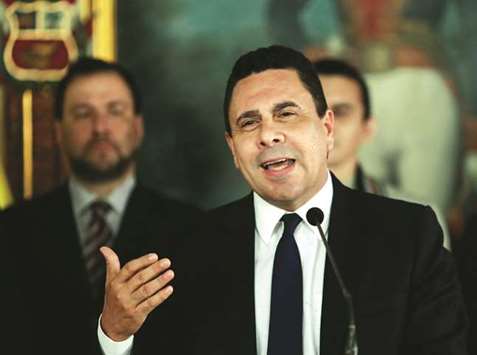Venezuelan President Nicolas Maduro’s government yesterday vowed to proceed with plans for a controversial new congress despite what it called a “brutal interventionist” threat of US economic sanctions. President Trump said on Monday he would take “strong and swift economic actions” if Maduro went ahead with the new body that would have power to rewrite Venezuela’s constitution and supersede other institutions.
Polls show a majority of Venezuelans oppose the assembly, which critics call tantamount to enshrining dictatorship in the South American Opec nation. Maduro insists it is the only way to bring peace after months of anti-government unrest that has killed 100 people and further hurt a crippled economy.
Foreign Minister Samuel Moncada said the July 30 vote for the legislative super-body known as a Constituent Assembly would go ahead. “It is an act of political sovereignty by the Republic. Nothing and nobody can stop it,” he told reporters.
“Venezuelans are free and will unite against the insolent threat from a xenophobic and racist government...(and) the United States’ brutal interventionist efforts.”
Trump called Maduro, who narrowly won election in 2013 to replace the late Hugo Chavez, “a bad leader who dreams of becoming a dictator”.
Maduro’s opponents say they drew 7.5mn people onto the streets at the weekend to vote in a symbolic referendum where 98% disagreed with the assembly plan.
Calls to cancel the assembly and instead hold conventional elections have come from around the world, including the European Union and major Latin American nations.
The ruling Socialist Party would likely be thrashed in any normal vote due to widespread anger over economic hardships.
“The Constituent Assembly should be abandoned to achieve a negotiated, safe and peaceful solution in Venezuela. The whole world is asking for that,” Colombia’s President Juan Manuel Santos tweeted.
Venezuelan opposition supporters have been in the streets for nearly four months demanding a presidential election, freedom for several hundred jailed activists, independence for the National Assembly legislature, and foreign aid. Protesters blocked roads in parts of Caracas yesterday.
Maduro insists opposition leaders are US pawns intent on sabotaging the economy and bringing him down through violence as part of an international right-wing conspiracy.
Decrying “imperialism” still resonates for some in a region scarred by Washington’s support of coups during the Cold War. Sanctions from Trump, who is largely unpopular abroad, could actually help unite the ruling Socialists.
Senior White House officials told Reuters last month the Trump administration was considering sanctions on Venezuela’s vital energy sector, including state oil company PDVSA.
The idea of striking at the core of Venezuela’s economy, which relies on oil for some 95% of export revenues, has been discussed at high levels of the administration as part of a wide-ranging review of US options.
But such an unprecedented step could deepen suffering for Venezuelans, already undergoing food shortages and soaring inflation during a fourth year of precipitous economic decline. It could also raise US fuel prices, which would be unpopular with American consumers.

Venezuelan Foreign Minister Samuel Moncada talks to the media during a news conference in Caracas, Venezuela July 18, 2017.
